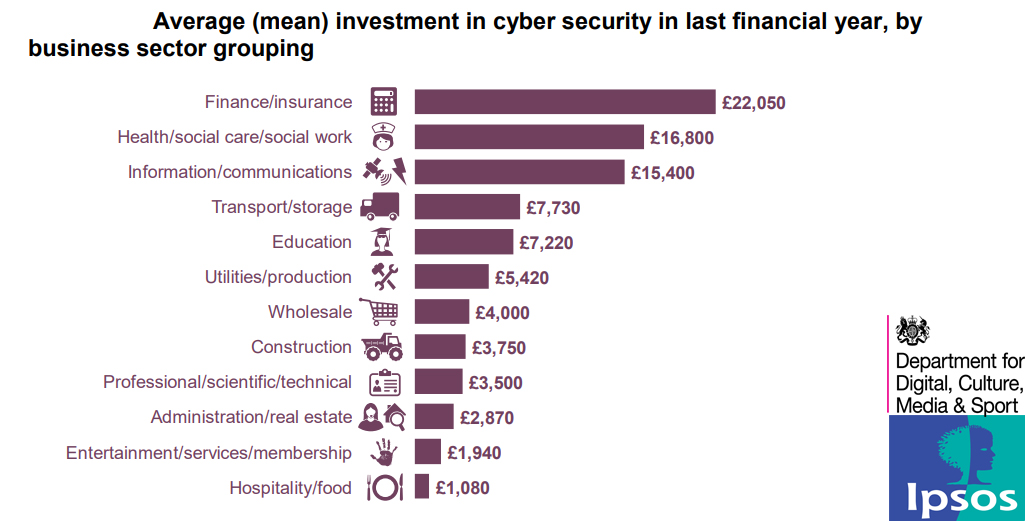Cyber Security Breaches Survey, 2019 | Department For Digital Culture, Media & Sport
Cybersecurity | UK
The increasing focus on moving customer interactions to digital channels means that strong cybersecurity discipline is more important than ever, as it provides a target for cybercriminals to attack. The threat landscape continues to evolve, criminals are looking to repurpose attacks used against banks to target new institutions such as insurers, e-retailers and the healthcare sector. Industrialization of cybercrime continues, with criminals scaling their operations, and looking to automate the targeting and exploitation of business networks. At the same time, businesses are investing more on their cybersecurity to be able to defend any cyber-attack. Because new cyber threats are emerging all the time, businesses have to monitor developments constantly and ensure their security systems are up to date to protect themselves more effectively from cyber-attacks. As much as new technologies have provided business with innovation and growth, it has also brought risks, cyber attacks are one of these risks.
The Key Findings of the “Cyber Security Breaches Survey, 2019” Report:
- 32% of UK businesses indicated that they need new measures to prevent future attacks.
- 48% reported that they identify one breach or attack at least per month.
- 33% of UK businesses have cybersecurity policies.
- 60% are using externally-hosted web services to host websites, emails and transfer or store data.
- 54% of UK businesses are investing in cybersecurity mainly to protect customers data.
- 49% of organizations are using external cyber security providers.
- 89% of surveyed businesses are implementing firewalls with an appropriate
configuration. - 33% of organizations have formal policies covering cybersecurity risks.
- What staff is permitted to do on the organization’s IT devices is one of the most common features of businesses cybersecurity policies with a rate of 81%.
- Fraudulent emails or being directed to fraudulent websites are the most types of breaches or attacks that business suffered from in the last year with a rate of 80%.

A Graph Shows The Average Investment in Cybersecurity in The Last Financial Year, by Business Sector Grouping, 2019.
The Content of “Cyber Security Breaches Survey, 2019” Report:
- Introduction:
- Code of practice for Official Statistics.
- Background.
- Methodology.
- Interpretation of findings.
- Acknowledgments.
- Profiling UK businesses and charities:
- Online exposure.
- Use of personal devices.
- Cloud computing.
- Awareness and attitudes.
- Perceived importance of cybersecurity.
- What drives engagement with cybersecurity?.
- Involvement of senior management.
- Sources of information.
- The General Data Protection Regulation.
- Approaches to cybersecurity:
- Investment in cybersecurity.
- Outsourcing cybersecurity.
- Risk management.
- Staff approaches.
- Governance and planning.
- Dealing with third-party suppliers or contractors.
- Implementing Government initiatives.
- Incidence and impact of breaches or attacks:
- Experience of breaches or attacks.
- How are businesses affected?
- The financial cost of breaches or attacks.
- Dealing with breaches or attacks:
- Identifying and understanding breaches or attacks.
- Incident response.
- Conclusions.
- Further information.
- Guide to statistical reliability.
Number of Pages:
- 66 Pages.
Pricing:
- Free.
Methodology:
Data were driven by a random probability telephone survey of 1,566 UK businesses and 514 UK registered charities was undertaken from 10 October 2018 to 20 December 2018. The data have been weighted to be statistically representative of these two populations. A total of 52 in-depth interviews were undertaken in January and February 2019 to follow up with businesses and charities that had participated in the survey and gain further qualitative insights.







